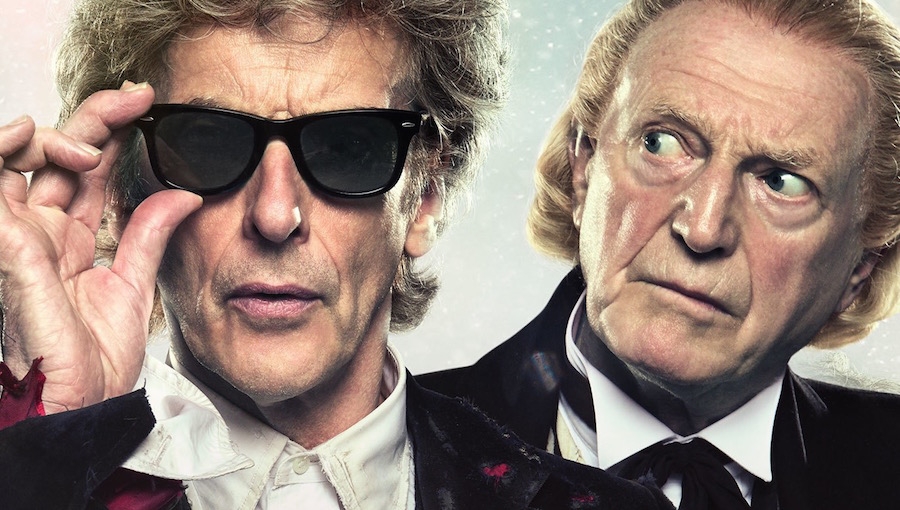Regeneration episodes on Doctor Who have a tendency to be a bit too self-indulgent—especially when they are paired with a head writer’s final episode. (Yes, I am talking about “The End of Time.”) The reason is obvious: The story is supposed to reflect back on the current era of the show while tying up loose ends and looking forward to the next era.
Thankfully, “Twice Upon a Time” pulled all of this off incredibly well. Modern Doctor Who is far more cinematic than classic Who which overall is great, but can hinder stories that deserve to be more personal in scope. All of the regenerations since the movie have been spectacular, universe-shattering conflicts until this year’s Christmas episode. It was refreshing to get a smaller-scale story (with no real villains) that allowed time for the Doctor(s) to look back at his/their life with quiet introspection.
Steven Moffat’s tenure as head writer for Doctor Who has been one of the show’s more divisive periods. I have been vocal about my problems with his direction of the show and have been ready for a change in leadership for a long time. Despite my issues, he has made some great contributions to the show, and the episode is a nice capstone that encapsulates the positive aspects of his run. First and foremost, Moffat’s work has always shone brightest in standalone episodes. Instead of being a convoluted resolution to a large mystery spanning a season or more, it was a single episode that told a complete story. Sure, it connects to the show’s long-running continuity (More on that later.), but the narrative works without all of that.
Another mainstay of his writing is mysterious creatures that work great at first, but then fizzle out upon further inspection. After years of the Weeping Angels, the Silence, and the Whisper Men getting more and more anti-climactic, we got the Testimony … and its rather subdued revelation actually worked really well. A glass woman (a digital interface for a databank known as the Testimony) is chasing a World War I captain (played by Doctor Who writer and actor Mark Gatiss) through time for the duration of the episode, and it is revealed that her motives are actually altruistic and not villainous. The Testimony travels throughout time to download every person’s consciousness at his/her moment of death in order to preserve his/her memories for all time. By not having any actual villain for the episode, Moffat was able to avoid some of his past problems of overexposing the monster of the week. It also allowed said monsters to step aside and let the Doctors take center stage. The reflection of Peter Capaldi as the Twelfth Doctor was not sidetracked, and our attention was not split between it and a major battle. The Testimony worked as a mirror that forced him to look back at himself and his beliefs.
As for the show’s continuity, the episode actually connects in several different places. Obviously, from the Twelfth Doctor’s perspective, it takes place seconds after the Series 10 finale. The First Doctor (wonderfully recreated by actor David Bradley), on the other hand, is nearing the end of “The Tenth Planet.”. It is an iconic, classic Who story that served as the introduction to the Cybermen and the Doctor’s first regeneration. (For those of you keeping score at home, this would mean that from the Cybermen’s perspective, it is sometime after the Series 10 finale that went back in time to see the Mondasians transform into the classic creatures.) At the time, William Hartnell played the original First Doctor, and his health conditions forced him to step down from the role. Not wanting to end the show, the idea of replacing him became the only viable option. The concept of regeneration was never intended to be part of the show, but a last-minute necessity that became the show’s most unique concept and the reason it could evolve and last over 50 years.
Through a cunning twist, the episode also sets up the Second Doctor storyline, “The Web of Fear.” Gatiss’ character is only referred to as “the Captain” until the end of the story, when his name is revealed to be Archibald Hamish Lethbridge-Stewart, whose family has a long history with the Doctor. The Doctor’s interaction with the Captain now explains why he began his long-running friendship with Brigadier Alistair Lethbridge-Stewart in “The Web of Fear” (at which point, he was still a Colonel). The Brigadier led UNIT (Doctor Who’s extraterrestrial military organization) and has interacted with many of the Doctors over the years. His daughter Kate Lethbridge-Stewart is the current head of UNIT.
I am not certain that Moffat always knew the setting he wanted to serve as a backdrop for his final story, but it feels like he did. It is just too perfect a fit for his finale, especially at Christmas. World War I saw some of humanity’s greatest horrors, but it also brought one of the brightest moments in our history. The Doctors return the Captain to what is supposed to be his death on December 25th, 1914, when his life is spared thanks to the Christmas truce. An actual historical event when peace broke out and spread through the trenches, as both sides laid down their weapons to celebrate together. That right there is the epitome of the Doctor and his/her views. All it takes to defeat evil is good. The Doctor fights against evil but will always give his/her adversaries a chance at redemption.
As Capaldi’s final scene approached, he spoke to his next iteration, instructing her to stay true to these values. Knowing that his core beliefs will never change, he allowed himself to regenerate and pass the torch to Jodie Whittaker. With an exciting cliffhanger, she and new head writer Chris Chibnall set up next season that promises a new era for Doctor Who in 2018.

